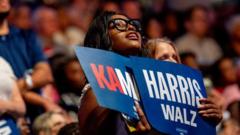On a balmy fall morning at the University of Michigan in Ann Arbor, a vibrant crowd of students stood eagerly in line at the early voting center, embodying the growing enthusiasm among young women to make their voices heard. Kamala Harris is looking towards this demographic to uplift her campaign in crucial states like Michigan and Arizona.
"There’s a palpable energy here," noted Keely Ganong, a third-year student and ardent supporter of Harris. "Leadership like hers is what our country needs." Her friend, Lola Nordlinger, echoed the sentiment, pointing out that issues of gender equality and abortion rights resonate deeply among those on campus.
With less than a week to go before the elections, the conversation around voting has reached a fever pitch among students. As Adrianna Pete, a 24-year-old volunteer aiming to educate her peers on the electoral process, observed, “Women are stepping up in ways I’ve never seen before.”
Polls reveal that Harris leads significantly among women aged 18-29, enjoying a 30-point advantage according to the Harvard Institute of Politics. This trend continues among college students, where she boasts a remarkable 38-point lead amongst her peers.
Amidst the packed Harris rally in Ann Arbor, Hannah Brocks, a 20-year-old activist, shared her motivations for supporting the Vice President. "Her compassion and empathy are what draw me to her,” said Brocks, who has engaged in various outreach efforts to encourage voter participation.
Historically, female voter turnout has surged, as seen in the 2020 elections when 10 million more women voted than men, a trend that early polling indicates may repeat itself. Current exit polls show a similar ratio with women making up approximately 55% of early voters.
However, the electoral landscape presents varying dynamics; while Harris leads among young non-white women, her advantage narrows among white women. Disparities are significant, as indicated by a Harvard survey demonstrating a 55-point lead among non-white women under 30 compared to a mere 13-point advantage with white women. Given the voting patterns of previous elections, this trend demands attention for Harris to secure broader support.
In Arizona, the stakes are even more pronounced, where the ballot includes a crucial question on enshrining abortion rights within the state constitution. Voter Mary Jelkovsky, wearing a bold message, expressed her hope that this will inspire many women to engage politically. The potential impact of personal experiences surrounding reproductive rights is underscoring the urgency of this election.
With voices advocating for reproductive justice, Harris anticipates these calls will rally not only loyal supporters but potentially convert even some Republican women disillusioned by the current administration. As Rebecca Gau, a former lifelong Republican, expressed her newfound excitement to vote for Harris, sentiments of fatigue with "toxic masculinity" are resonating among women of varying political backgrounds.
Nonetheless, not all women are poised to shift their loyalty. Texas voter Tracey Sorrel shared her concerns about Harris’s approach to abortion rights, revealing the stark divisions that exist even within the female electorate.
As the election rapidly approaches, young women's voices are poised to become a driving force in shaping the political landscape, making the upcoming days critical for the Harris campaign and the battle for women’s rights in America.






















